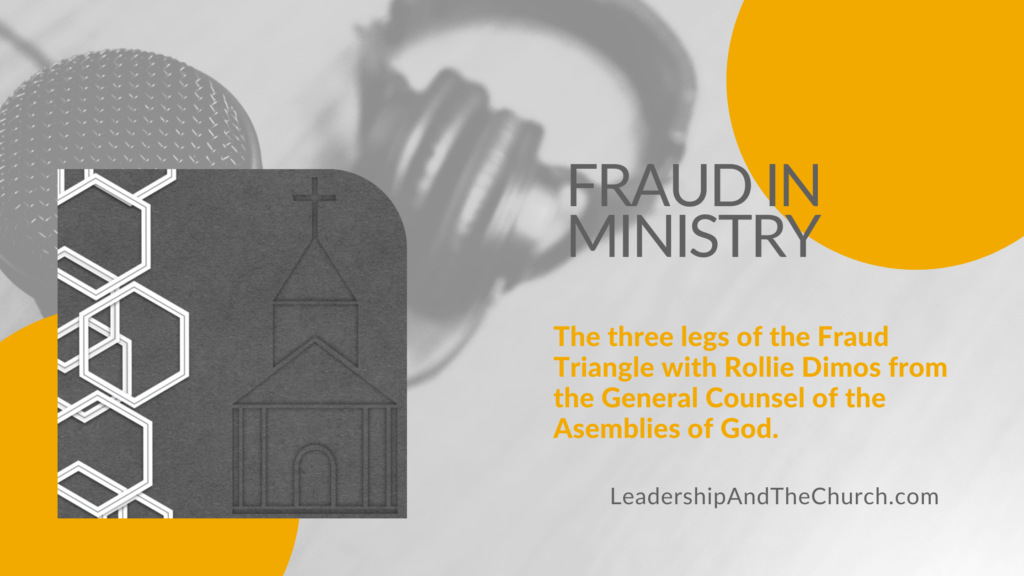Chris Miller, President of Miller Management, is the host of this week’s episode. He is joined by his colleague, Rollie Dimos, Internal Auditor at the General Counsel at the Assemblies of God.

This month, we will be discussing why fraud is an issue, share some examples, and detail ways to prevent fraud and what to do if you suspect fraud in your ministry. This series is not just for the financial people in church, Pastors and other leaders in the church need to hear about steps you can take, too.
Fraud Education
We think it’s not going to happen to us. So we don’t put controls in place or looking out for opportunities for fraud. In fact, we trust people in the church until they give us a reason not too in most cases.
Rationalization is the first pit-fall we fall into. We just can’t believe that church-going people would steal. So we often don’t see it. And we especially don’t put up blocks to prevent it.
Fraud Triangle
Financial pressure or stressor is the first leg of the triangle. And opportunity is the second leg. You notice there is a gap in accountability and take advantage of it. Third is your own rationalization, that you somehow earn this thing that isn’t yours.
Learn more about the Fraud Triangle
Church boards and church leaders need to be up on controls and boundaries, to keep us on the straight and narrow. Can we remove all these obstacles from other’s lives? Not of all, but of some.
Financial pressure – we (as the church) can teach you biblical financial principles in sunday school and in courses offered at the church. Rationalization – again, we (as the church) can teach you biblical principals and disciple you through small groups. Opportunity – this is the one you can remove completly through best practices.
It’s been our experience that most people don’t come to the church with the intent to steal. Rather, they see the opportunity, have some kind of pressure, and are able to rationalize away their behavior. There is only one type of person that doesn’t need all 3 legs. Those people are sociopaths and are not the norm. The norm could be male or female, could be short or longer term employees, lay persons or ministers. Really, anyone, when the three legs of the fraud triangle are presented.
Fraud Loss by the Numbers
Average religious fraud loss, according to the ACFE 2022 Report to the Nations is $78,000. So our question is how much of your offerings do you want to dump in the trash? Most would say none, but they also don’t put up any safeguards.
Every organiztion looses 5% of their profits due to fraud that is never caught, according to the same report. With the offering basket example, that would be 3 weeks of offerings that never make it to you.
Once there is some kind of error, ministries are usually slow to react and then they often spend time looking in the wrong places. The ACFE report says fraud occurs over 12-18 at a minimum. So even when fraud is found (and in some cases paid back) there is probably more.
World-wide fraud in ministry used to be less than money that was given away to missions. Then is crept up to the same amount. Now, it has far exceeded that number.
Coming Up
Join us next week as we continue the conversation. If you suspect there might be fraud in your ministry, don’t wait. Reach out to a fraud examiner at Miller Management at 816-382-3050 or GoodFaithAccounting.com.
Until then, listen to last year’s Reducing Fraud in Ministry series.
Join the conversation, see behind the scenes, and learn more on our Instagram and X pages.
Special thanks to our guest, Rollie Dimos, and our masters of all things Podcasting, Chris and Lauren Miller, for this first episode in our Fraud in Ministry series.
